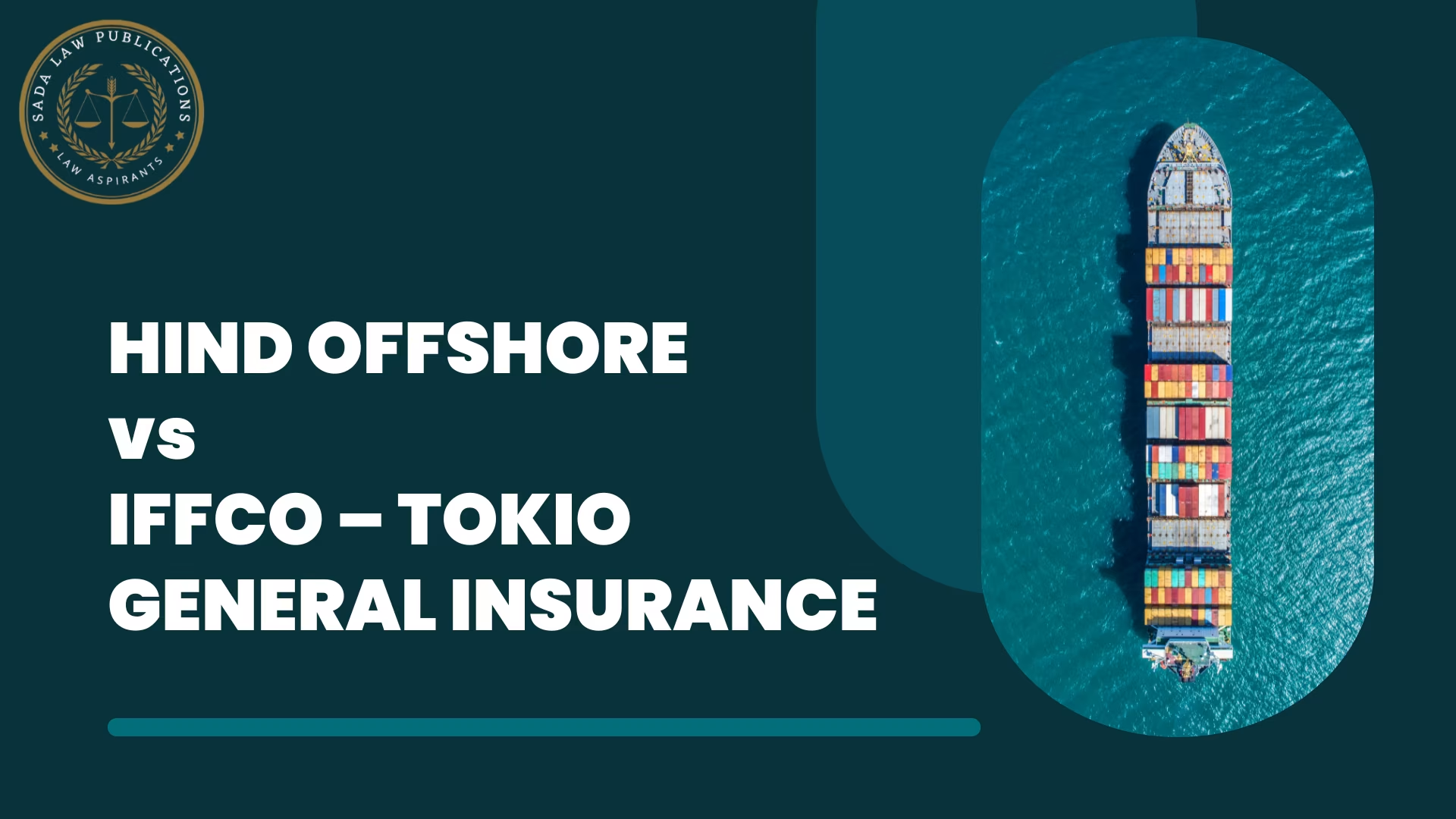Hind Offshore Pvt. Ltd. v. IFFCO–Tokio General Insurance Co. Ltd. (2023)
- Reha Bhargav
- 14 October, 2025

Introduction
The dispute in Hind Offshore Pvt. Ltd. v. IFFCO–Tokio General Insurance Co. Ltd. centers on a marine insurance policy issued for a commercial vessel. The appellant, Hind Offshore Pvt. Ltd., insured its vessel under a hull policy with IFFCO–Tokio General Insurance Co. Ltd. When the vessel sustained damage, the insurer rejected the claim, citing breach of class warranty and failure to disclose material facts regarding the vessel’s classification status. The matter progressed to the Supreme Court of India, which examined whether the repudiation complied with established principles of marine insurance law.
Facts of the Case
Policy Details: Hind Offshore Pvt. Ltd. obtained a marine hull insurance policy for its vessel MV Doora from IFFCO–Tokio for the period 28 January 2009 to 27 January 2010.
Incident: On 15 October 2009, the vessel suffered seawater ingress while berthed at Bhavnagar, causing substantial damage.
Claim and Repudiation: The insured filed a claim under the policy. IFFCO–Tokio repudiated the claim, asserting that:
The vessel had suffered structural damage prior to the incident.
The vessel had lost classification with the Indian Register of Shipping (IRS), a recognized classification authority.
The insured failed to disclose the loss of class, breaching the class warranty clause and constituting non-disclosure of material facts.
Procedural History:
The National Consumer Disputes Redressal Commission (NCDRC) upheld the insurer’s repudiation.
The appellant appealed to the Supreme Court of India.
Issue of the Case
Whether IFFCO–Tokio General Insurance Co. Ltd. was justified in repudiating the marine insurance claim on the grounds of:
Breach of the class warranty clause; and
Non-disclosure of material facts concerning the vessel’s condition and classification status.
Arguments
Appellant’s Contentions (Hind Offshore Pvt. Ltd.)
The vessel was seaworthy and operational at the time of the incident.
Any issues with the IRS classification were minor and technical, not material to the insurance risk.
The insurer’s repudiation was arbitrary and contrary to the terms of the policy.
The insured had not intentionally concealed any material information.
The damage claimed was within the policy’s coverage scope.
Respondent’s Contentions (IFFCO–Tokio General Insurance Co. Ltd.)
Maintenance of a valid IRS classification was a fundamental policy condition.
The insured failed to disclose that the vessel had lost its classification before the incident, constituting material non-disclosure.
The class warranty clause required continuous classification, and any lapse voided the policy.
The insurer’s liability extended only to risks covered under valid classification, and breach of this warranty nullified coverage.
Judgment
The Supreme Court of India, in its judgment dated 9 August 2023, upheld the NCDRC’s decision and dismissed the appeal.
Key findings included:
Breach of Class Warranty:
The Court held that maintaining the vessel’s classification with the IRS was a material condition precedent.
Loss of classification constituted a fundamental breach affecting the vessel’s insurability.
Non-Disclosure of Material Facts:
The insured’s failure to inform the insurer about the loss of classification amounted to suppression of material facts directly influencing the risk assessment.
Validity of Repudiation:
The insurer’s repudiation was legally valid and supported by the contractual terms.
Role of Classification in Marine Insurance:
The Court reiterated that classification serves as a critical indicator of seaworthiness, directly affecting underwriters’ risk evaluation.
The Court therefore affirmed that the insurer was justified in repudiating the claim and dismissed the appeal without relief to the appellant.
Conclusion
The Supreme Court confirmed that compliance with class warranty provisions is a mandatory obligation in marine insurance contracts. The loss of classification, coupled with non-disclosure of that fact, constituted a material breach entitling the insurer to repudiate the claim. The judgment reinforces that insurers are not obligated to indemnify risks materially altered by the insured’s omissions. Consequently, Hind Offshore Pvt. Ltd. was denied relief, and the repudiation by IFFCO–Tokio General Insurance Co. Ltd. was upheld.





